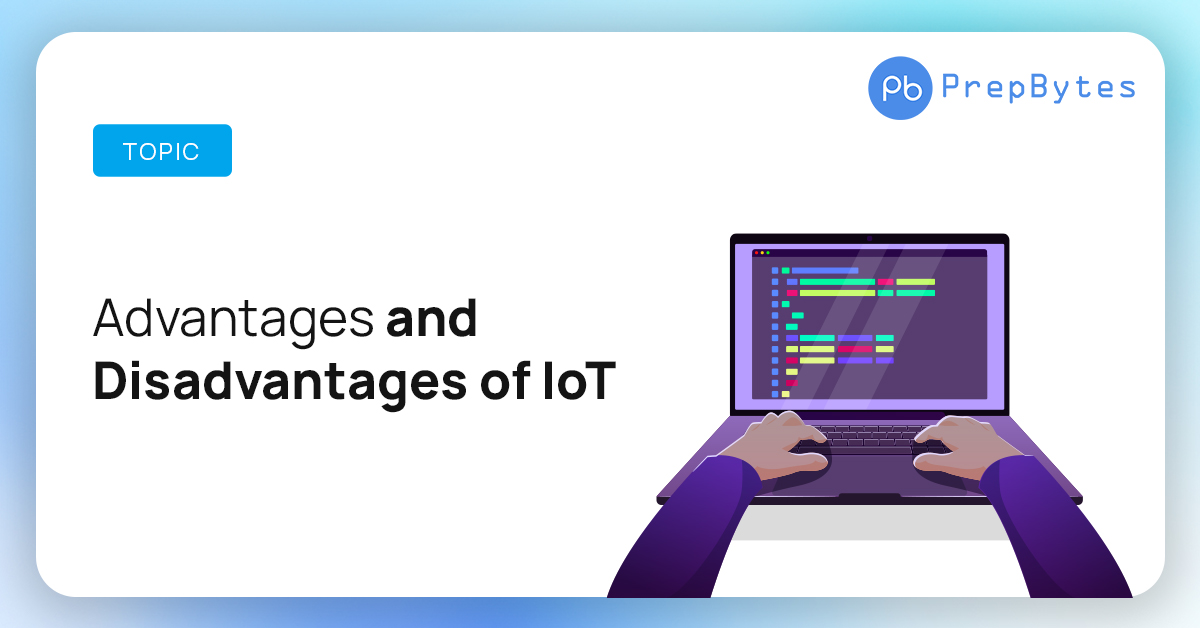Last Updated on February 8, 2024 by Abhishek Sharma

The Internet of Things (IoT) has emerged as a transformative force, connecting physical devices to the internet and enabling them to communicate, collect data, and perform various tasks autonomously. This interconnected network of smart devices has revolutionized industries, homes, and cities, offering numerous advantages while also presenting certain challenges. In this article, we will explore the advantages and disadvantages of IoT, highlighting its impact on technology, society, and the economy.
Advantages of IoT
Advantages of IoT are discussed below:
Enhanced Efficiency and Productivity
IoT enables the automation and optimization of processes, leading to increased efficiency and productivity. By connecting devices and sensors, businesses can gather real-time data, monitor operations, and make data-driven decisions. This results in streamlined workflows, reduced manual intervention, and improved resource allocation.
Improved Convenience and Quality of Life
IoT devices offer enhanced convenience and improve the quality of life for individuals. Smart home technologies, wearable devices, and connected appliances allow for remote control, monitoring, and automation, simplifying daily tasks and providing personalized experiences. IoT also enables advancements in healthcare, transportation, and energy management, enhancing safety, comfort, and sustainability.
Innovation and New Business Opportunities
IoT fuels innovation by enabling the development of new products, services, and business models. The ability to collect and analyze vast amounts of data from connected devices unlocks insights and opportunities for optimization, predictive maintenance, and tailored customer experiences. IoT ecosystems create fertile ground for startups and entrepreneurs to explore novel applications and disrupt traditional industries.
Environmental Sustainability
IoT plays a crucial role in promoting environmental sustainability. By monitoring and managing energy consumption, optimizing resource utilization, and enabling smart grid systems, the IoT contributes to reducing waste, conserving energy, and mitigating environmental impact. Smart cities leverage IoT to enhance urban planning, transportation efficiency, and waste management, fostering sustainable living environments.
Disadvantages of IoT
Following are the Disadvantages of IoT:
Security and Privacy Risks
As the number of connected devices grows, so does the potential attack surface for cybercriminals. IoT devices may have vulnerabilities that can be exploited, leading to data breaches, unauthorized access, or even the hijacking of devices. Additionally, the vast amount of personal data collected by IoT devices raises concerns about privacy and data misuse, necessitating robust security measures and stringent data protection regulations.
Complexity and Interoperability Challenges
The complexity of IoT systems presents challenges in terms of interoperability and integration. Various devices, protocols, and platforms must seamlessly work together, requiring standardization efforts and compatibility among different vendors. Ensuring interoperability, managing updates, and maintaining compatibility over time can be resource-intensive and technically demanding.
Reliability and Infrastructure Dependencies
IoT heavily relies on a robust network infrastructure and reliable connectivity. Network outages, latency issues, or disruptions in communication can hamper the performance and functionality of IoT devices. Additionally, as more devices become interconnected, the scalability and reliability of the underlying infrastructure become critical factors in ensuring smooth operations.
Ethical and Social Implications
The widespread adoption of IoT raises ethical concerns surrounding data privacy, surveillance, and autonomy. The collection of vast amounts of personal data can potentially infringe on individual privacy rights if not appropriately handled. Additionally, IoT-enabled technologies may challenge traditional notions of consent, autonomy, and accountability, necessitating ethical frameworks and regulations to address these complexities.
Conclusion
While the Internet of Things offers numerous advantages, including increased efficiency, enhanced connectivity, and data-driven insights, it also presents challenges such as security concerns, interoperability issues, and complexity in management. As IoT technology continues to evolve, it is essential to address these challenges proactively through robust security measures, standardization efforts, and comprehensive management practices. By mitigating the disadvantages and maximizing the benefits of IoT, we can harness its transformative potential to create a more connected, efficient, and sustainable future.
Frequently Asked Questions (FAQs) Related to Advantages and Disadvantages of IoT
Below are some of the FAQs related to Advantages and Disadvantages of IoT:
1. How does IoT technology enhance efficiency in manufacturing?
IoT technology streamlines production processes, monitors equipment performance in real-time, and optimizes resource utilization, leading to increased efficiency and productivity in manufacturing operations.
2. What are some security concerns associated with IoT devices?
The proliferation of IoT devices raises concerns about data security and privacy. Vulnerabilities in IoT devices can be exploited by hackers to gain unauthorized access, manipulate data, or launch cyber attacks, compromising personal privacy and sensitive information.
3. How can interoperability issues affect the scalability of IoT deployments?
The lack of standardization and interoperability among IoT devices can hinder seamless integration and communication. Incompatibilities between devices, protocols, and platforms may limit the scalability and effectiveness of IoT deployments, making it challenging to manage and expand IoT networks.
4. What measures can be taken to address privacy concerns related to IoT?
To address privacy concerns related to IoT, organizations can implement robust security measures, such as encryption, authentication, and access controls, to protect sensitive data. Additionally, regulatory compliance and privacy policies can help safeguard personal information and ensure transparency in data collection and usage practices.
Q5. Are there limitations to the scalability of IoT systems?
Scalability can be a challenge in IoT deployments, especially when dealing with a large number of devices. The network infrastructure must be capable of handling increased traffic and processing power, and data management systems need to efficiently handle the influx of data. Careful planning and scalable architectures are necessary to ensure the smooth operation and growth of IoT systems.


